Lecture1 句子结构
托福长难句120句解析
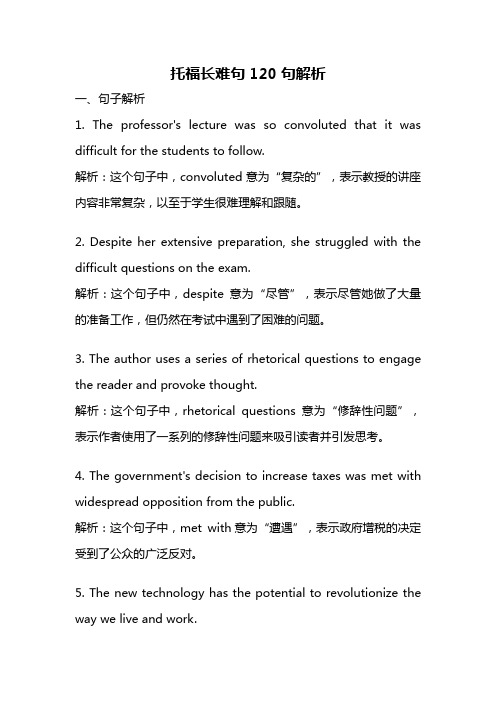
托福长难句120句解析一、句子解析1. The professor's lecture was so convoluted that it was difficult for the students to follow.解析:这个句子中,convoluted意为“复杂的”,表示教授的讲座内容非常复杂,以至于学生很难理解和跟随。
2. Despite her extensive preparation, she struggled with the difficult questions on the exam.解析:这个句子中,despite意为“尽管”,表示尽管她做了大量的准备工作,但仍然在考试中遇到了困难的问题。
3. The author uses a series of rhetorical questions to engage the reader and provoke thought.解析:这个句子中,rhetorical questions意为“修辞性问题”,表示作者使用了一系列的修辞性问题来吸引读者并引发思考。
4. The government's decision to increase taxes was met with widespread opposition from the public.解析:这个句子中,met with意为“遭遇”,表示政府增税的决定受到了公众的广泛反对。
5. The new technology has the potential to revolutionize the way we live and work.解析:这个句子中,has the potential to意为“有潜力”,表示新技术有潜力彻底改变我们的生活和工作方式。
6. The company's profits have plummeted as a result of the economic downturn.解析:这个句子中,plummeted意为“暴跌”,表示由于经济衰退,公司的利润暴跌。
英语简单句子结构分析

英语简单句子结构分析由于汉语与英语形成的背景不同,所以二者在句子结构上存在一定的差异,这种差异可能会对熟悉国语的我们在英语学习上带来一定的麻烦。
下面是店铺带来的英语简单句子结构,欢迎阅读!英语简单句子结构精选简单句的五种基本句型1. 主语+谓语 S+V2. 主语+谓语+宾语 S+V+O3. 主语+谓语动词+宾语+宾补 S+V+O+C4. 主语+谓语+间接宾语(人)+直接宾语(物) S+V+O+O5. 主语+系动词+表语 S+LV+P英语句子当中的成分分为:主、谓、宾、定、状、补六类。
宾语:表示动词的对象、承受者或后果。
定语:用来修饰、限定、说明名词或代词的品质与特征的。
状语:句子重要修饰成分,是谓语的另一个附加成分,附加在谓语中心语补语:起补充说明作用的部分,作用对象是主语和宾语,具有鲜明的定语性描写或限制性功能。
1. 主语S+谓语Vi(不及物动词)I see. I’ll try. Time flies.He can swim. Who knows? That depends.Everybody smiled. Water flows.The children are playing. Tim is sleeping.She is crying. He is reading. It’s snowing.该句型中的动词为不及物,不及物动词词义自身完全,不需要宾语补足其意义,但有些动词词义必须由一个状语(不能没有状语)进行补充。
Birds sing beautifully. He reads loudly. He went on holiday.We go for a walk. They sit under the tree. Your sister dancesbeautifully. Jim and Tom study together every day. She swims like a fish.Her lecture lasted an hour. She is studying hard at the university.There be句型也属于这一结构。
第1讲 各司其职的8大句子成分
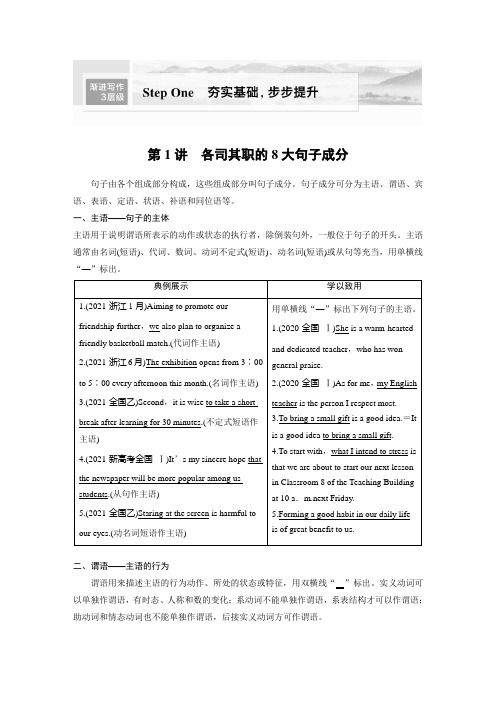
第1讲各司其职的8大句子成分句子由各个组成部分构成,这些组成部分叫句子成分。
句子成分可分为主语、谓语、宾语、表语、定语、状语、补语和同位语等。
一、主语——句子的主体主语用于说明谓语所表示的动作或状态的执行者,除倒装句外,一般位于句子的开头。
主语通常由名词(短语)、代词、数词、动词不定式(短语)、动名词(短语)或从句等充当,用单横线“—”标出。
典例展示学以致用1.(2021·浙江1月)Aiming to promote our friendship further,we also plan to organize a friendly basketball match.(代词作主语)2.(2021·浙江6月)The exhibition opens from 3∶00 to 5∶00 every afternoon this month.(名词作主语)3.(2021·全国乙)Second,it is wise to take a short break after learning for 30 minutes.(不定式短语作主语)4.(2021·新高考全国Ⅰ)It’s my sincere hope that the newspaper will be more popular among us students.(从句作主语)5.(2021·全国乙)Staring at the screen is harmful to our eyes.(动名词短语作主语) 用单横线“—”标出下列句子的主语。
1.(2020·全国Ⅰ)She is a warm-hearted and dedicated teacher,who has won general praise.2.(2020·全国Ⅰ)As for me,my English teacher is the person I respect most.3.To bring a small gift is a good idea.=It is a good idea to bring a small gift.4.To start with,what I intend to stress is that we are about to start our next lesson in Classroom 8 of the Teaching Building at 10 a.m.next Friday.5.Forming a good habit in our daily life is of great benefit to us.二、谓语——主语的行为谓语用来描述主语的行为动作、所处的状态或特征,用双横线“”标出。
1专业英语简介
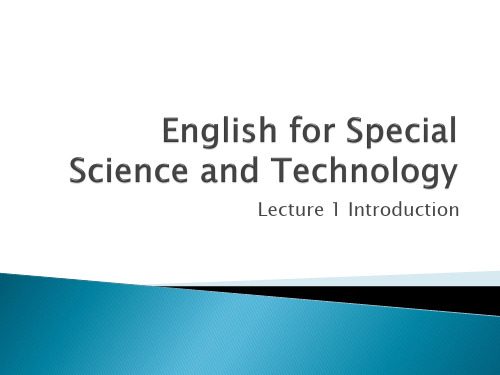
◦ ◦ ◦ ◦
在英语中可以用名词来修饰名词,在科技英语词汇中 这种用法非常多见。这样的名词两用可简化语言结构, 使文章言简意赅。 earth fault 接地故障 phase fault 相间故障 relay panel 断电器屏 reactor winding 电抗线圈
的繁达多重密切关系的概 念, 使推理严谨,叙述准确。因此在电力英语的句子中 修饰成分、限制成分和各种词组等较多,从而构成长句。 如: The reluctance motor operates synchronously at a speed which is determined by the supply frequency and the number of poles for which the stator is wound. 磁阻电动机是以某一速率同步转动,该速率是由电源频率 和锭子绕指的级数决定的。
这种名词修饰名词的词组还可以进一步发展下去,如: ◦ generator power output 发动机的输出功率 ◦ voltage output converter 电压输出转换器 ◦ power distribution system 配电系统
由于大量使用名词,也就必然要多用介词,从而构 成较多的介词短语。就介词短语本身来说,用“介 词+行为名词”构成的短语来表示动作的状态,要 比用相应的动词来表示动作要客观一些。如:
在科技英语中多见各种词性的互相转换。几乎每个技 术性名词都同时又可以做同义的形容词。如: variable 变量(名词),变量的(形容词) hybrid 混合物(名词)混合的(形容词) auxiliary 辅机,辅助设备(名词)辅助的, 补助 的(形容词) Optimum 最适宜 (名词)最适宜的 (形 容词) mix 使混和(动词)混合(名词)
句子结构和成分分析

句子结构和成分分析第一讲英语的句子结构和成分主讲张燮一. 主谓结构(主语+不及物动词)1.The sun is shining2.They talked for half an hour.3.The pen writes well.*主语:可以做主语的有名词(boy. fire. apple等),代词(I, you ,it. she等),数词(two, thirteen),动词不定式(to learn English, to take a taxi),动词ing形式(playing football, watching TV)以及从句(what he did, That he is from Sichuan).#不能做主语的是:动词及动词短语(do, do some cooking, listen to the radio),介词短语(by bike, in the classroom.)学生常见错误如:1.Do something is better than do nothing.2.In the classroom have three boys.3.By bike is good for health.4.Listen to the music make me happy.*不及物动词(vi)指该动词不能跟宾语,也就是说该动词后没有宾语.(如上例)。
常见的不及物动词有(go, come, arrive, sleep, fall, appear, get. look, turn等)。
如:1.We go work every day. 2.My mother arrived Chengdu yesterday.3she often looks me.如果不及物动词后面跟宾语必须加介词过渡,转化为介词宾语。
1.we go to work every day.2.My mother arrived in Chengdu yesterday.3.She often looks at me.*谓语:由动词构成,位于主语之后。
句子成分及简单句的五大基本句型
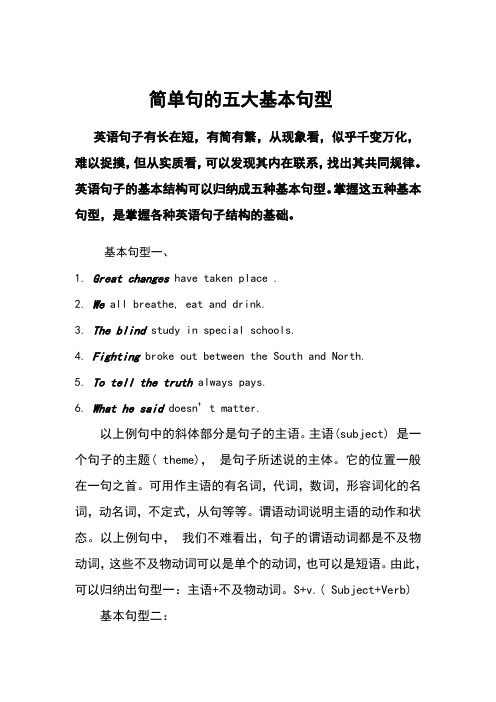
简单句的五大基本句型英语句子有长在短,有简有繁,从现象看,似乎千变万化,难以捉摸,但从实质看,可以发现其内在联系,找出其共同规律。
英语句子的基本结构可以归纳成五种基本句型。
掌握这五种基本句型,是掌握各种英语句子结构的基础。
基本句型一、1.Great changes have taken place .2.We all breathe, eat and drink.3.The blind study in special schools.4.Fighting broke out between the South and North.5.To tell the truth always pays.6.What he said doesn’t matter.以上例句中的斜体部分是句子的主语。
主语(subject) 是一个句子的主题( theme),是句子所述说的主体。
它的位置一般在一句之首。
可用作主语的有名词,代词,数词,形容词化的名词,动名词,不定式,从句等等。
谓语动词说明主语的动作和状态。
以上例句中,我们不难看出,句子的谓语动词都是不及物动词,这些不及物动词可以是单个的动词,也可以是短语。
由此,可以归纳出句型一:主语+不及物动词。
S+v.( Subject+Verb)基本句型二:is a teacher.??best composition is hers.and five is ten. ?is asleep.?father is in.?picture is on the wall.?watch is gone \ missing\ lost.?see is to believe.question is whether they will come.?以上例句中的斜体部分是句子的表语。
表语说明主语的性质、特征、状态或身分,通常有名词,代词,数词,形容词,副词,介词短语,形容词化的分词,不定式或者表语从句充当。
被动语态句子结构

被动语态句子结构被动语态的句子是以“动词+过去分词”的形式来表达,如果要特别强调动作或行为的执行者时,句子后面需接by~,译为“被(由)……”。
1、被动语态的句型肯定句:主语+be +过去分词+(by~).否定句:主语+be not +过去分词+(by~).一般疑问句:Be +主语+过去分词+(by~)?特殊疑问句:疑问词+be +主语+过去分词+(by~)?被动语态的时态是由be的时态决定的,be是什么时态,全句就是什么时态,be动词后面的过去分词不变。
2、被动语态的十种时态以动词give为例,其被动语态的各种时态构成如下:(1)一般现在时例:History is made by the people.历史是人民创造的。
(2)一般过去时例:These new cars were made in Tianjing in 1994.这些新车是1994年在天津生产的。
(3)一般将来时例:Li Ming will be asked to attend the lecture.李明将被邀请参加讲座。
(4)现在进行时例:A new railway is being built.一条新铁路正在修建。
(5)过去进行时例:The roads were being widened.路那时正在加宽。
(6)现在完成时例:He has been sent to work in Shanghai.他已经被派往去上海工作了。
(7)过去完成时例:A new hotel had been built when I got there.我到那儿时,一座新旅馆已经建好了。
(8)过去将来时例:He said a new hotel would be built in two months.他说两个月后新旅馆就会建好了的。
3、被动语态的否定句和疑问句例:English is not used in European countries.欧洲国家不使用英语。
Lecture_1_句子结构
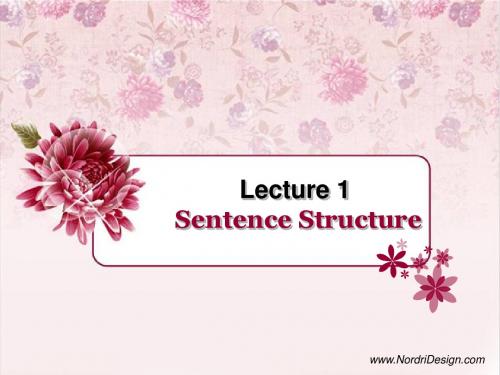
§ 2 Transformation and expansion
The basic clause types are all affirmative statements with verbs in the active voice. An affirmative clause can be transformed into a negative; a statement into a question; and an active clause into a passive clause. These are called transformations.
See P13
Compound Subject
• The boys and the girls are planning a dance. • Fruit flies and ladybugs are insects. • Joshua and Daniel got lost in the woods.
Two Ways of Sentence Analysis
•
• • NPSentenceC来自ause VP NP•
•
Subject
All the men
Predicate Verb Object
have done their best.
Two Ways of Sentence Analysis
Sentence
Double Predicate
• He left home a mere child and returned quite a different man. (Surface Structure) (Deep Structure: He was a mere child when he left home, and he became quite a different man when he returned.) • Everyone stood listening intently. • The doctor sat reading a newspaper in the shade. • A bird fell dead to the ground. • He died beloved, revered, and mourned by millions of the working people.
英语句子成分分析大全
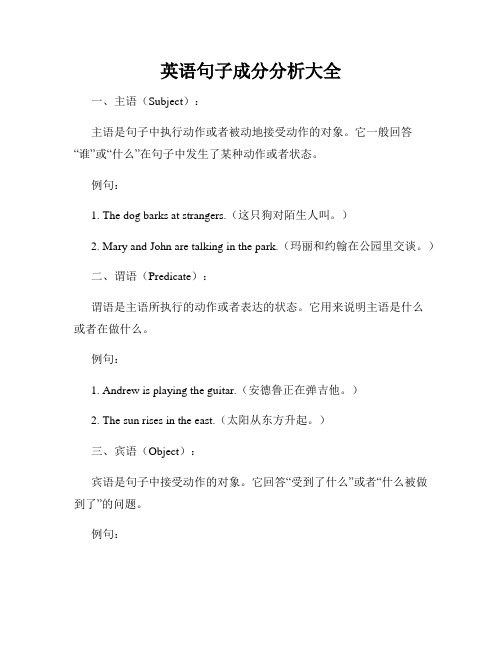
英语句子成分分析大全一、主语(Subject):主语是句子中执行动作或者被动地接受动作的对象。
它一般回答“谁”或“什么”在句子中发生了某种动作或者状态。
例句:1. The dog barks at strangers.(这只狗对陌生人叫。
)2. Mary and John are talking in the park.(玛丽和约翰在公园里交谈。
)二、谓语(Predicate):谓语是主语所执行的动作或者表达的状态。
它用来说明主语是什么或者在做什么。
例句:1. Andrew is playing the guitar.(安德鲁正在弹吉他。
)2. The sun rises in the east.(太阳从东方升起。
)三、宾语(Object):宾语是句子中接受动作的对象。
它回答“受到了什么”或者“什么被做到了”的问题。
例句:1. The teacher assigns homework to the students.(老师布置作业给学生。
)2. She bought a new car.(她买了一辆新车。
)四、表语(Predicate Nominative/Predicate Adjective):表语是用来说明主语的身份、性质、状态或者特征的成分。
它通常位于系动词后面,与主语相连。
例句:1. The cake smells delicious.(蛋糕闻起来很好吃。
)2. He became a doctor.(他成为了一名医生。
)五、定语(Adjective):定语用来修饰名词或者代词,可以说明它们的性质、状态或者特征。
例句:1. I saw a black cat.(我看到了一只黑猫。
)2. This is an interesting book.(这是一本有趣的书。
)六、状语(Adverb):状语用来修饰动词、形容词、副词或者全句,可以说明方式、时间、地点、原因等。
例句:1. Tom quickly ran to catch the bus.(汤姆快速地跑过去赶公交车。
英语句子成分主语谓语宾语表语定语状语补语同位语讲解
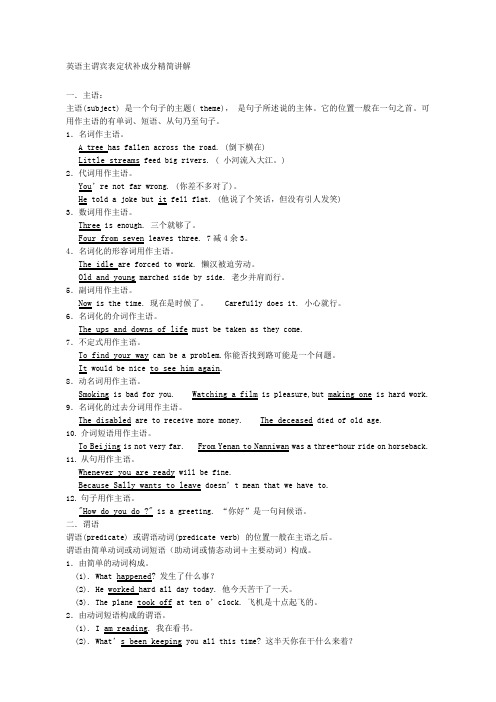
英语主谓宾表定状补成分精简讲解一.主语:主语(subject) 是一个句子的主题( theme),是句子所述说的主体。
它的位置一般在一句之首。
可用作主语的有单词、短语、从句乃至句子。
1.名词作主语。
A tree has fallen across the road. (倒下横在)Little streams feed big rivers. ( 小河流入大江。
)2.代词用作主语。
You’re not far wrong. (你差不多对了)。
He told a joke but it fell flat. (他说了个笑话,但没有引人发笑)3.数词用作主语。
Three is enough. 三个就够了。
Four from seven leaves three. 7减4余3。
4.名词化的形容词用作主语。
The idle are forced to work. 懒汉被迫劳动。
Old and young marched side by side. 老少并肩而行。
5.副词用作主语。
Now is the time. 现在是时候了。
Carefully does it. 小心就行。
6.名词化的介词作主语。
The ups and downs of life must be taken as they come.7.不定式用作主语。
To find your way can be a problem.你能否找到路可能是一个问题。
It would be nice to see him again.8.动名词用作主语。
Smoking is bad for you. Watching a film is pleasure,but making one is hard work. 9.名词化的过去分词用作主语。
The disabled are to receive more money. The deceased died of old age.10.介词短语用作主语。
如何分析英语句子结构-图文(2024版)

① My brother hasn't done his homework. A B C D ② People all over the world speak English. A B C D ③ You must pay good attention to your pronunciation. A B C D
① D ② A ③ D ④ D
挑出下列句中的状语
7、补足语:补充说明句中的主语或者宾语的,作补足语的有:名词、形容词、介词短语、不定式和分词(短语)。如I find it interesting中的interesting.
8、同位语:把一个名词(短语)、代词或从句放在另一名词或代词后,用以说明前者的性质或情况,这样的名词或代词叫同位语。如We Chinese people ,love peace中的Chinese people是主语We的同位语.
① C ② C ③ C ④ C
挑出下列句中的宾语补足语
二、按照句子的结构来分,英语的句子有以下三种类型: 1、简单句:简单句只有一个主语(或并列主语)和一个谓语动词(或并列谓语动词)。如:My brother and I go to school at half past seven in the morning and come back home at seven in the evening.
独立主格结构英语句子结构

独立主格结构独立主格结构(Independent Genitive)有两局部组成,前一部份是或者代词,后一局部是非(不定式、动名词和)或形容词、、或介词短语.前后两局部具有逻辑主谓关系.独立主格结构在句中做状语,多用于书面语.独立主格结构本身不是句子,在句子xx状语,表示时间、原因、条件、伴随、目的等.详细概述非谓语动词作状语,其逻辑须与主句主语保持一致.假设不一致,非谓语动词形式须另带主语,从而构成复合结构的形式作状语.这种结构称为〃独立结构〃.其中,非谓语动词主动用V・ing,被动用V-ed.非谓语动词及其短语前面带有逻辑主语,逻辑主语的又是主格,故常称为〃独立主格〃.〃独立结构〃在句中起状语作用,相当于状语从句,表示时间、原因、条件、方式或伴随等情况.功能独立主格结构主要用于描绘性文字中,其作用相当于一个,常用来表示时间、原因、条件、行为方式或伴随情况等.例如:表示时间The meeting being over, all of us went home,开完会后我们都回家了.Her work done, she sat down for a cup of tea.她干完了活, 坐下来喝茶.表示条件The condition being favourable, he may succeed.假设条件有利,他或许能成功.表示原因There being no taxes, we had to walk,没有出租车,我们只好步行.1 / 15He wrapped her up with great care, the night being dark and frosty. 夜又黑又冷,所以他把她裹得严严实实的.表示伴随情况Almost all metals are good conductors, silver being the best of all. 几乎所有的金属都是良导体,而银那么是最好的导体.(=Almost all metals are good conductors, and silver is the best of all.)用法独立主格结构主要表示发生的时间、原因、条件或伴随情况等,相当于一个状语从句或并列句.用作时间状语The work done(=After the work had been done), we went home. 1:作完成后, 我们就回家了.用作条件状语Weather permitting(=lf weather permits), they will go on an outing to the beach tomorrow.如果天气允许的话,他们将在明天组织一次xx小游.用作原因状语An important lecture to be given tomorrow(=As an important lecture will be given tomorrow), the professor has to stay up late into the night. 由于明天要发表一个重要的演讲,教授不得不熬夜到很晚.用作伴随状语He was lying on the grass,his hands crossed under his head(=and his hands were crossed under his head),他躺在草地上,两手交叉枕在脑后.表示补充说明2/15We redoubled our efforts, each man working like two.我们加倍努力,一个人干两个人的活.*注:独立主格结构表示时间、条件或原因时,相当于一个状语从句,一般放在句首,表示原因时还可放在句末;表伴随状况或补充说明时,相当于一个并列句,通常放于句末.形式1> 一般独立主格形式:与主句逻辑关系松散形式为:n. + -ed/-ing形式;n. +不定式;n. +; n. + ; n. +副词.;名词/主格代词+现在分词名词/主格代词与之间是主谓关系.如:The girl staring at him(= As the girl stared at him), he didn't know what to say. 姑娘两眼望着他,他不知道说什么好.Time permitting(= If time permits), we will go for an outing tomorrow. 如果时间允许的话,我们明天去郊游.名词/主格代词+过去分词名词/主格代词与过去分词之间是动宾关系.如:The problems solved(= As the problems were solved), the quality has been improved.随着问题的解决,质量已经提升了.Her glasses broken(= Because her glasses were broken), she couldn't see the words on the blackboard,由于眼镜摔坏了,她看不见黑板上的字.名词/主格代词+不定式名词/主格代词与不定式之间是主谓关系,且强调的是一次具体性的动作. 如:3/15He is going to make a model plane, some old parts to help. 借助于一些I日零件,他要做一个飞机模型.They said good-bye to each other, one to go home, the other to go to the bookstore.他们道别后,一个回了家,一个去了书店.名词/主格代词+形容词如:An air accident happened to the plane,nobody alive.那架飞机遭遇了空难,无一人生还.So many people absent, the meeting had to be called off,这么多人缺席,会议不得不取消.名词/主格代词+副词如:He put on his sweater,wrong side out,他把毛衣穿反了.The meeting over, they all went home.会议一结束,他们就都回家了.名词/主格代词+介词短语如:The boy goes to the classroom,book in hand,那男孩手里拿着书去教室.Mary was sitting near the fire, her back towards the door.靠近火炉坐着,背对着门.2>with引导的独立主格:与主句逻辑关系紧密形式为:with + n. + -ed/-ing 形式;with + n. +abj.; with +n. + 介词短语3>each引导的强调型独立主格:尾的复数名词4/15形式为:句子+复数名词结尾,each +介词短语/形容词短语/名词短语/・ing 形式/-ed形式如:4>其他形式There being +名词〔代词〕如:There being nothing else to do, we went home.没有别的事可做,我们就回家了.There being no further business, I declare the meeting closed. 没有再要讨论的事了,我宣布散会.It being +名词〔代词〕如:It being Christmas, the government offices were closed. 由于圣诞节的缘故, 政府机关都休息.It being a holiday, all the shops were shut,由于今天是,所有商店都关门了.特点1〕独立主格结构的与句子的主语不同,它独立存在.2〕名词或代词与后面的,形容词,副词,不定式,等是主谓关系.3〕独立主格结构一般有逗号与主句分开.举例:The test finished, we began our holiday.=When the test was finished, we began our holiday.5/15测试结束了,我们开始放假.The president assassinated, the whole country was in deep sorrow.=After the president was assassinated, the whole country was in deep sorrow.总统被谋杀了,举国上下沉浸在悲哀之中.Weather permitting, we are going to visit you tomorrow.如果天气允许,我们明天去看你.This done, we went home.工作完成后,我们才回家.The meeting gone over, everyone tired to go home earlier.会议结束后,每个人都想早点回家.He came into the room,his ears red with cold.他回到了房子里,耳朵冻坏了.He came out of the library, a large book under his arm.他夹着本厚书,走出了图书馆注:独立主格结构有时可在其前加上介词with.如:Don't sleep with the windows open.别开着窗睡觉.He was lying on the bed with all his clothes on.他和衣躺在床上.She came in with a book in her hand,她手里拿着一本书走了进来.He fell asleep with the lamp burning.他没熄灯就睡着了.I won't be able to go on holiday with my mother being il 由于妈妈有病,我无法去度假.6/15He sat there with his eyes dosed,他闭目坐在那儿.All the afternoon he worked with the door locked.整个下午他都锁着门在房里工作.I can't go out with all these clothes to wash.要洗这些衣服,我无法出去了.考前须知1•独立主格与状语从句的转换当状语从句的主语与主句的主语不是指同一个对象时,可用独立主格结构取代状语从句,但不再保存连词.如:After class was over (=Class being over / Class over), the students soon left the classroom.卜课后,学生很快离开了课室.2.不能省略being (having been)的情形:在以下两种情况下,独立主格结构中的being (或having been)不能省略.(1)独立主格的逻辑主语是代词时.如:It being Sunday, we went to church. 由于是星期天,我们去了做礼拜.(2)在There being+名词的结构中.如:There being no bus, we had to go home on foot.由于没有公共汽车,所以我们不得不步行回家.3.在〃名词(或代词)+介词短语〃构成的独立主格结构中,一般不用和冠词.如:Miss Smith entered the classroom, book in hand.xx 走进了课室,手里拿着一本书.比拟with 的复合结构.如:Miss Smith entered the classroom, with a book in her hand.4.独立主格结构没有所有格形式The chief-editor arriving, we began the meeting.主编来了,我们开始开会.(比拟复合结构.)例如请看下面一道题:Not far from the school there was a garden,owner seated in it playing chess with his little grandson every afternoon.7 / 15A. itsB. whoseC. whichD. that【分析】此题很容易误选B,许多同学会认为句中逗号后是一个非限制性的,whose在定语从句中用作定语修饰其后的名词owner.此分析从外表上看,似乎天衣无缝,但实质上是错的,原因是空格后根本不是一个句子,由于没有谓语.尽管句中有两个动词,但它们都是非谓语动词.也许有的同学认为,其中的seated可视为谓语动词,但是注意,seat用作动词时,它总是及物的,其后要么接,要么它就用于,所以假设在seated前加上助动词is,那么可以选择B (当然假设将seated改为sitting,也应选择A).所以此题最正确答案选Ao请再看一个类似的例子:(1)He wrote a lot of novels, many of translated into foreignlanguages.A. itB. themC.whichD. that(2)He wrote a lot of novels, many of were translated into foreignlanguages.A. it B. them C. which D. that第⑴应选B,而不能选C,是由于句中的translated是过去分词(非谓语动词),假设选C,那么该从句无谓语;第⑵应选C,该句是典型的,由于该句修饰的是前面的novels,即指物,所以只能用which做of的宾语,故此题选C.再请看下面一例:(3)He wrote a lot of novels, and many of were translated intoforeign languages.A. itB. themC. whichD. that【分析】此题与上面的第⑵题不同,两句间多了一个并列连词and,说明这是一个并列句,故应选B,那么不能选C.请做做以下三题(答案均为B):8/15(1)There I met several people, two of being foreigners.〔独立主格结构〕A. whichB. themC. whomD. that(2)There I met several people, two of were foreigners.〔非限制性定语从句〕A. whichB. whomC. whoD. that(3)There I met several people, and two of were foreigners.〔两个句子〕A. whichB. themC. whomD. that英语句子结构一.简单句:英语句子看上去纷繁庞杂,但仔细观察不外乎五个根本句式. 这五个根本句式可以演变出多种复杂的英语句子.换言之,绝大多数英语句子都是由这五个根本句式生成的.这五个根本句式如下:S十V主谓结构S十V十P主系表结构S十V十.主谓XX结构S十V十.1十.2主谓xx结构S十V十.主谓xx结构说明:S=主语;V=谓语;P =表语;O=xx语;.1 =间接xx语;02 =直接xx语;C=xx语补足语五个根本句式详细解释如下:LS十V句式在此句式中,V是不及物动词,又叫自动词〔vi.例如:9/15He runs quickly.他跑得快.They listened carefully.他们听得很仔细.He suffered from cold and hunger.他挨冻受饿.China belongs to the third world country. xx 属于第三世界国家. The gas has given out.煤气用完了.My ink has run out.我的钢笔水用完了.S十V十P句式The story sounds interesting.这个故事听起来有趣.The desk feels hard.书桌摸起来很硬.The cake tastes nice.饼尝起来很香.The flowers smell sweet and nice. 花闻起来xx.You have grown taller than before.你长得比以前高了.He has suddenly fallen ill.他忽然病倒了.He stood quite still.他静静地站看.He could never turn traitor to his country.他永远不会背叛他的祖国.注意:有些动词同时也是及物动词,可构成SVO句式,例如:He looked me up and down.他上下打量我.He reached his hand to feel the elephant.他伸出手来摸象.They are tasting the fish.他,们在品尝鱼.They grow rice in their home town.他们在家乡种水稻.10 /15He's got a chair to sit on.他有椅子坐.Please turn the sentence into English. 请把这个句xx 英语.3.S十V十.句式在此句式中,V是及物动词(vt.),因此有宾语.例如:I saw a film yesterday.我昨天看了一部电影.Have you read the story?你读过这个故事吗?They found their home easily.他们很容易找到他们的家.They built a house last year.他们去年建了一所房子.They've put up a factory in the village.他们在村里建了一座工厂.They have taken good care of the children.这些孩子他们照看得很好.You should look after your children well.你应该好好照看你的孩子.4.S十V十.1十02句式在此句式中,V是带有双宾语的及物动词.常见的须带双宾语的动词有give, ask, bring, offer, send, pay, lend, show, tell, buy, get; rob, warn 等.例如:He gave me a book/a book to me.他给我一本书.He brought me a pen/a pen to me.他带给我一枝钢笔.He offered me his seat/his seat to me.他把座位让给我.注意下边动词改写后介词的变化:Mother bought me a book/a book for me.妈妈给我买了一本书.He got me a chair/a chair for me.他给我弄了一把椅子.11 / 15Please do me a favor/a favor for me. 请帮我一下.He asked me a question/a question of me. 他问我个问题.注意,下边动词只有一种说法:They robbed the old man of his money.他们抢了老人的钱.He's warned me of the danger,他警告我注意危险.The doctor has cured him of his disease.医生治好了他的病.We must rid the house of the rats.我们必须赶走屋里的老鼠.They deprived him of his right to speak.他们剥夺了他说话的权利.5.S十V十.句式在此句式中,V是有宾语补足语的及物动词.常带宾语补足语的词有形容词、副词、介词短语、名词、不定式、现在分词、过去分词常见的可接宾语补足语的动词很多,哪些动词可接哪几种形式作宾补,须根据动词的惯用法而定,不能统而概论.请看下面的例子.They made the girl angry.他们使这个女孩生气了.They found her happy that day.他们发现那天她很快乐.I found him out.我发现他出去了.I saw him in.我见他在家.They saw a foot mark in the sand.他们发现沙地上有脚印.They named the boy Charlie.他们给这个男孩起名为查理.They felt the car moving fast.他们感到汽车行驶得很快.I heard the glass broken just now.我刚刚听到玻璃碎了.12 /15He found the doctor of study closed to him.他发现研究所的大门对他关闭了.英语的并列句一般情况下引不起巨大的阅读障碍,由于在分句之间往往有固定的连接词说明前后分句的关系.这样的连接词有以and为代表的表示意义延伸的并列连词、以.r为代表的表示选择概念的并列连词、以but为代表的表示转折的并列连词和表示原因的for四个类型.第一种包括and, not only ... but (also )..., neither ( nor).第二种包括or, either …or …;第三种包括but, while, whereas等.第四种只有一个for.对此我们分别举一个例句说明问题:(l)As is reported, a trade agreement was signed and a cultural exchange was arranged.(2)Not only is he himself interested in the subject but all his students are beginning to show an interest in it.(3)Dr. Fisher neither loves the environment, nor is he accustomed to the weather.(4)The children can go with us, or they can stay at home.(5)You can either go it by yourself, or you can ask someone else to do it.(6)The young man has often been praised, but he is never conceited.(7)While our country has plenty of oil, theirs has none.(8)They want to live in town, whereas we would rather live in the country.(9)They apparently have a good drainage system, for the streets never seem to flood after a downpour.有必要说明的是以上的关联词并非只能有一个含义,比方and就可以表示意义增补、动作先后、转折或让步、条件和结果等等一些用法.这里笔者只是提醒大家区分从句,所以这方面的语言知识请参考相关的语法书.13 / 15另外我们还应该把并列分句和并列结构(coordinate construction)区分开来. 并列结构是由并列连词或者其他并列手段例如标点符号连接起来的语法结构序列,它包括并列分句,也包括并列的词或者词组.3、附属句构成附属关系的复杂句包括名词性分句(Nominal Clauses)(可以作主语、宾语、同位语、主语补语)、关系分句(Relative Clauses)、状语分句(Adverbial Clauses) o对于它们的连接词,在相应的语法书上都不难找到,这里就不再多讲了.需要提醒读者的是,在判定句子的类型之后,最主要的工作就是分析简单句的成分,找到主句的谓语,真正抓住句子的纲领.下面请作练习二,首先识别多重分句的类型,然后找出主句和附属分句的谓语.Laboratory scientists accustomed to noticing subtle changes in the properties of substances they are investigating are doubtless better than you or I at certain sorts of observations.这里的主语是Laboratory scientists,但是后面跟了一个过去分词定语,其中分词中的介词又跟了一个-ing形式,-ing形式后又接了一个宾语和一个带有定语的状语.本句的谓语是are doubtless better than o4 •英语的信息末端原那么的应用在英语中,信息含量大的局部往往出现在句子的末尾.这个特点一方面造就了一些非正常语序的句子,另一方面可以给我们提供线索,帮助我们正确理解英语中的长句.我们知道,一个信息发出者要表达丰富的信息,离开从句是寸步难行的.可是不管句子结构多么复杂,根本的句型还是只有五种.下面我们可以通过逐一的分析,探讨英语难句形成的规律.对于SV结构,由于英语句子一般是末尾的信息含量大,所以这种句子往往难以构成阅读困难,至多是主语位置有定语从句或者同位语从句.例如:(例子).SVO 结构的难点在于主语和宾语都可以连接定语从句;SVC结构也难以构成较复杂的句子;SVOC结构如果出现长句,那么往往是补语被调整到宾语的前面;SV..结构也要注意哪个是直接宾语,哪个是间接宾语.14 / 15SVOC: People often let their fear of speaking up and appearing more dull- witted than their peers interfere with their understanding.Derived from theoretical considerations and confirmed by observations, the velocity-distance law has made secure the concept of an expanding universe.下面请做练习,识别主句的根本类型.1.They would find relevant the antislavery attitudes of Northerners during the colonial period, the conflict over slavery in the Constitutional Convention, the Missouri Compromise, the militant abolitionist movement of the 1830, and the Compromise of 1850.2.The study made clear that the working class that is so over-represented in crime statistics consists of lower-class people living in the lower-class areas of large cities.from the People's Daily on current affairs in .15 /15。
关于英语语法句子结构

关于英语语法句子结构英语成为中国政治、经济和文化全面走向国际化的不可或缺的战略性工具,成为国家和人才核心竞争力的所在。
店铺整理了关于英语语法句子结构,欢迎阅读!关于英语语法句子结构一状语:是修饰动词、形容词、副词以及全句的句子成分.可用作状语的有副词、代词、数词、形容词、不定式、分词、介词短语、从句等.1.副词最常用作状语,位置比较灵活,可置句末、句首和句中.He speaks the language badly but read it well.这种语言,他讲得不好,但阅读能力很强.Naturally we expect hotel guests to lock their doors. 当我们期望旅馆的旅客把房门锁上.2.状语按用途来分,可以分为时间、地点、方式、原因、结果、目的、条件、让步、程度、方式、伴随等(1).时间状语,多位于句末和句首,有时亦可置于句中Shall we do the shopping today or tomorrow?In China now leads the world.(2).地点状语,多置于句末,有时也位于句首和句中.There are plenty of fish in the sea.She kissed her mother on the platform(月台).(3).原因状语,包括表理由的状语,多置于句末,有时亦可置于句首.Because he was ill ,Tom lost his job.I eat potatoes because I like them.(4). 结果状语,多由不定式、分词和从句表示,常位于句末.She woke(醒) suddenly to find someone standing in the doorway.She spoke so softly that I couldn’t hear what she said.(5). 目的状语,多由不定式、介词短语和从句等表示,常位于句末,强调时可以置于句首.He ran for shelter(隐蔽处).他跑去避雨.In order to get into a good school, I must study even harder.(6). 条件状语.多由短语和从句表示,常置于句末和句首.We’ll be lucky to get there before dark.If he were to come, what should we say to him?(7). 让步状语,由短语和从句表示,常置于句末和句首.For all his money, he didn’t seem happy. 他尽管有钱,但似乎并不幸福.He helped me although he didn’t know me.(8).程度状语.常由副词、介词短语及从句等表示.The lecture is very interesting.To what extent would you trust them? 你对他们信任程度如何?(9)伴随状语,常由短语和独立主格等表示.对位于句末和句首.My train starts at six, arriving at Chicago at ten.He stood there ,pipe(烟斗) in mouth.关于英语语法句子结构二1)主语:是一句的主体,是全句述说的对象,常用名词,数词或代词担任,一般放于句首。
Lecture 1 英语语法导论

• (根据构词法分类)
2) Classification in terms of grammatical function (根据语法功能分类)
2009-9
9
1)简单词、派生词、复合词 In terms of word-formation, words
e.g. He spoke loudly and clearly. Be a man. Do not act so slowly. She spoke very clearly indeed.
21
• 5) The prepositional phrase (介词词组)
The prepositional phrase is a phrase with a preposition as its head. The general pattern of a prepositional phrase is: (modifier+) preposition + complementation
• 词: Paul, one, schoolboys, I, of, nicest, know, is, the
• 词素:Paul, one, school, boy, -s, I, is, know, the, nice,
-est
3
Sentence
Clause
NP
VP
Prep P
Det
N
Aux Adv MV Prep Det N
• (分为两大类) • free morphemes and • bound morphemes.
5
英语句子结构和成分详解
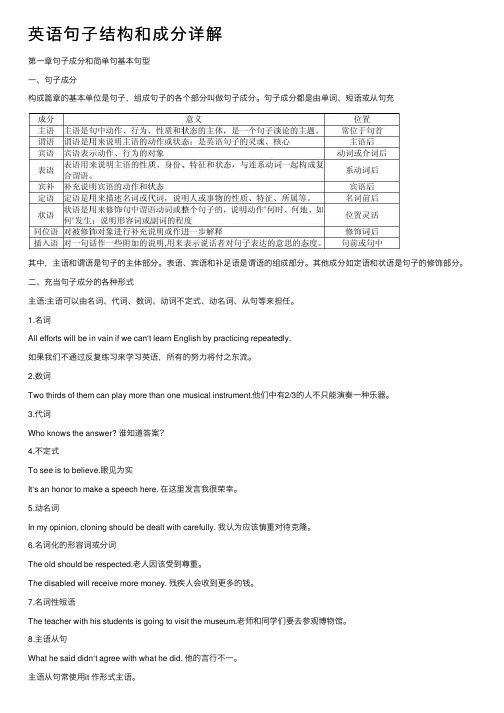
英语句⼦结构和成分详解第⼀章句⼦成分和简单句基本句型⼀、句⼦成分构成篇章的基本单位是句⼦,组成句⼦的各个部分叫做句⼦成分。
句⼦成分都是由单词、短语或从句充其中,主语和谓语是句⼦的主体部分。
表语、宾语和补⾜语是谓语的组成部分。
其他成分如定语和状语是句⼦的修饰部分。
⼆、充当句⼦成分的各种形式主语:主语可以由名词、代词、数词、动词不定式、动名词、从句等来担任。
1.名词All efforts will be in vain if we can‘t learn English by practicing repeatedly.如果我们不通过反复练习来学习英语,所有的努⼒将付之东流。
2.数词Two thirds of them can play more than one musical instrument.他们中有2/3的⼈不只能演奏⼀种乐器。
3.代词Who knows the answer? 谁知道答案?4.不定式To see is to believe.眼见为实It‘s an honor to make a speech here. 在这⾥发⾔我很荣幸。
5.动名词In my opinion, cloning should be dealt with carefully. 我认为应该慎重对待克隆。
6.名词化的形容词或分词The old should be respected.⽼⼈因该受到尊重。
The disabled will receive more money. 残疾⼈会收到更多的钱。
7.名词性短语The teacher with his students is going to visit the museum.⽼师和同学们要去参观博物馆。
8.主语从句What he said didn‘t agree with what he did. 他的⾔⾏不⼀。
主语从句常使⽤it 作形式主语。
It is uncertain whether he can come to Jenny‘s birthday party or not.It happened that he was out when I got there. 当我到那⼉时,碰巧他不在。
Lecture 1 句子结构
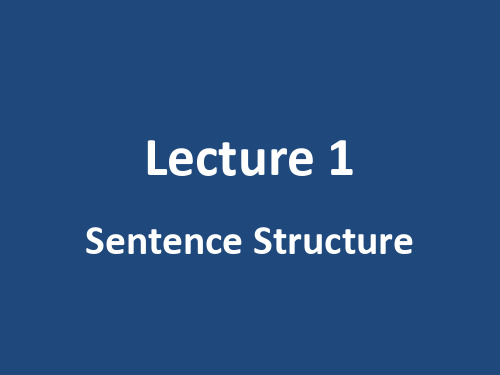
• In communication, we have the chances to choose whatever type of meaning satisfies our purpose. Different choices will result in different communicative effects.
examples • This interesting story made these little children very happy. • Jack gave Joan a ring. • Jack fell to the ground dead. • Walden Pond is now the site of many tourist stands.
To sum up, one need to have at least these three qualities in order to become a good teacher, whom the students will always remember as being exceptionally respectable.
The meaning choices of the subject
• Jack murdered Joan with a gun. • Joan was murdered by Jack with a gun. • A gun killed Joan. • Cancer deprives many people of their lives. • The hall can seat 50 people for a conference. • Learning Chinese Kongfu is by no means easy.
句子结构
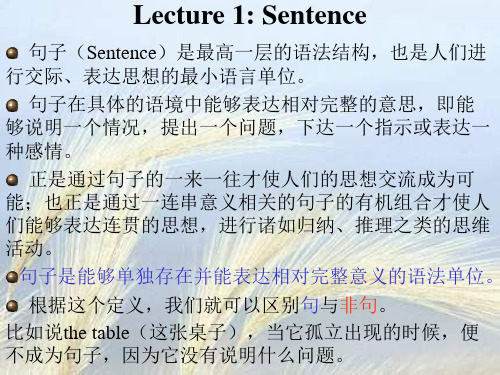
句子(Sentence)是最高一层的语法结构,也是人们进 行交际、表达思想的最小语言单位。 句子在具体的语境中能够表达相对完整的意思,即能 够说明一个情况,提出一个问题,下达一个指示或表达一 种感情。 正是通过句子的一来一往才使人们的思想交流成为可 能;也正是通过一连串意义相关的句子的有机组合才使人 们能够表达连贯的思想,进行诸如归纳、推理之类的思维 活动。 句子是能够单独存在并能表达相对完整意义的语法单位。 根据这个定义,我们就可以区别句与非句。 比如说the table(这张桌子),当它孤立出现的时候,便 不成为句子,因为它没有说明什么问题。
因此,On the table,The Chinese 在一定的语境中,既可 单独存在,也可表达完整的意思,从而应该算是句子,也 可叫做不完全句(Minor Sentence)。
英语里还有一种不完全句并非依靠上下文,而完全依赖 于特定的言语环境。 例如:广场木牌上的No parking!(不许停车!),池 边的告示No fishing!(不许钓鱼!),溺水者的呼叫Help !(救命呀!),冒烟窗口的喊声Fire!(起火啦!救火 呀!),这类结构并没有上下文,也很难说到底省略了什 么,但它们既能独立存在,又能表达完整的意义,起着明 确的交际作用,所以,也该算是句子。 句子是建立在分句的基础上,可以包含一个或一个以上 的分句。 只包含一个简单独立分句的句子叫做“简单句” (Simple Sentence),这时句子和独立分句在含义上是没 有区别的。
2)主语+不及物动词(简称SV结构) 在SV结构中,主动词是不及物动词(Intransitive Verb)。 这个结构的谓语可能仅仅只有谓语动词,即只有动词词组,而不 附带其他成分。 例如:My head aches. His plan has changed. 在SV结构中,状语(Adverbial)通常不是必不可少的成分。 比如在 The weather often changes in England(英国天气多变)中, 如果把状语often和in England拿掉,剩下的SV结构The weather changes,还是个完整的分句结构,它的意义还是明确无误的。 但是,在有一些结构中,由于主动词的词汇意义关系,必须带有 状语,否则结构不完整,意义不明确。 例如: The Hunters live in London.亨特家住在伦敦。 正由于状语在这类结构中是必不可少的成分,所以也可以把主语 +不及物动词+状语(SVA)看成是另外一种句型。
过去进行时的句子结构是什么词

过去进行时的句子结构是什么词过去进行时是英语语法中的一个时态,用于描述在过去某一时刻正在发生或进行的动作或状态。
一般来说,过去进行时的结构由“was/were + 动词的现在分词”组成。
下面将详细介绍过去进行时的句子结构,并给出三个例子。
过去进行时的句子结构在过去进行时的句子中,主要使用“was/were + 动词的现在分词”来构成。
具体来说,主语前面使用“was”表示单数,使用“were”表示复数,接着是动词的现在分词。
下面是具体的句子结构:1. 主语 + was/were + 动词的现在分词例如:- I was watching TV when he called me.(我正在看电视的时候他打来了电话。
)- They were chatting at the coffee shop when I walked in.(我走进咖啡店的时候,他们正在聊天。
)- She was washing her hair when the power went out.(停电的时候,她正在洗头。
)这种结构中的“was/were”作为句子的谓语动词,表明动作发生的时间是在过去,而动词的现在分词则适用于“正在进行”这一含义,表示一个动作正在进行。
2. 主语 + was/were + not + 动词的现在分词例如:- I was not paying attention during the lecture.(在演讲期间我没有注意力。
)- They were not listening to the teacher’s instructions.(他们没有听老师的指示。
)- She was not smiling when I entered the room.(我进入房间时,她没有微笑。
)这种结构中,“not”将“was/were”和动词的现在分词隔开,构成否定形式。
这种句子的含义是过去一个时刻动作并没有进行或存在。
句子成分
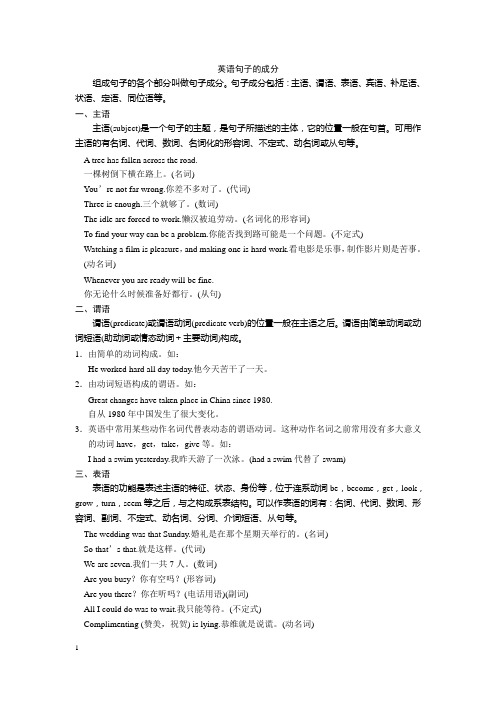
英语句子的成分组成句子的各个部分叫做句子成分。
句子成分包括:主语、谓语、表语、宾语、补足语、状语、定语、同位语等。
一、主语主语(subject)是一个句子的主题,是句子所描述的主体,它的位置一般在句首。
可用作主语的有名词、代词、数词、名词化的形容词、不定式、动名词或从句等。
A tree has fallen across the road.一棵树倒下横在路上。
(名词)Y ou’re not far wrong.你差不多对了。
(代词)Three is enough.三个就够了。
(数词)The idle are forced to work.懒汉被迫劳动。
(名词化的形容词)To find your way can be a problem.你能否找到路可能是一个问题。
(不定式)Watching a film is pleasure,and making one is hard work.看电影是乐事,制作影片则是苦事。
(动名词)Whenever you are ready will be fine.你无论什么时候准备好都行。
(从句)二、谓语谓语(predicate)或谓语动词(predicate verb)的位置一般在主语之后。
谓语由简单动词或动词短语(助动词或情态动词+主要动词)构成。
1.由简单的动词构成。
如:He worked hard all day today.他今天苦干了一天。
2.由动词短语构成的谓语。
如:Great changes have taken place in China since 1980.自从1980年中国发生了很大变化。
3.英语中常用某些动作名词代替表动态的谓语动词。
这种动作名词之前常用没有多大意义的动词have,get,take,give等。
如:I had a swim yesterday.我昨天游了一次泳。
(had a swim代替了swam)三、表语表语的功能是表述主语的特征、状态、身份等,位于连系动词be,become,get,look,grow,turn,seem等之后,与之构成系表结构。
- 1、下载文档前请自行甄别文档内容的完整性,平台不提供额外的编辑、内容补充、找答案等附加服务。
- 2、"仅部分预览"的文档,不可在线预览部分如存在完整性等问题,可反馈申请退款(可完整预览的文档不适用该条件!)。
- 3、如文档侵犯您的权益,请联系客服反馈,我们会尽快为您处理(人工客服工作时间:9:00-18:30)。
作表语的成分
例句
名词
名词所有格 代词 数词 形容词 副词 不定式 动名词 过去分词 现在分词
7. 状语
状语是修饰动词、形容词、副词以及全句的句子成分。 状语有时在基本结构中是必须得,否则基本结构的意义 就不会完整。状语位置非常灵活。 The girl is improving remarkably. The ancient castle is remarkably beautiful. My love is like a red, red rose, that is newly sprung in June. The students are improving remarkably fast. Unfortunately, I didn’t get the scores report.
例句 作定语的 成分 Beethoven is a natural musician. 形容词
名词 代词 His mother gave a sports car to him. He is their friend.
序数词
基数词 不定式
不定式复合结
I will give you a second chance.
5. 补语
补语是一种补足主语和宾语的意义的句子 成分,即主语补语和宾语补语。
主语补语
通常位于主语之前或谓语之后: Tired and sleepy, I went to bed. He came home sick. Her brother died young. He was found dead. She gazed at him speechless for a moment.
并列谓语
A student volunteer chooses a topic and starts to talk about it. It you want further details, you may ask our people for additional information. I am reading.
常见的带双宾语的及物动词
answer, get, offer, refuse, take, bring, give, owe, save, teach, buy, hand, pass, sell, tell, deny, keep, pay, send, throw, do, leave, play, show, wish, fetch, lend, promise, sing, write, find, make, read
Lecture1 句子结构
句子有各个组成部分构成,这些组成部分 叫做句子的成分。总的来说,句子皆由两 大部分组成,一是主语部分,一是谓语部 分,但句子的成分更加明确具体,可分为 主语、谓语(谓语动词)、表语、宾语、 定语、状语、补足语、独立成分等。
1.主语
主语是一个句子的主题,是一个句子所述 说的主体。一般位于一句之首。可作主语 的有单词、短语、从句及句子——名词、 代词、数词、名词化的形容词、名词化的 介词、不定式、动名词、名词化的过去分 词、从句、句子等。
I am a postgraduate student studying chemistry.
This is a map of Canada. There are a bunch of flowers on the vase.
限定性定语从 Beer is made from spouting barley grains which is fermented with yeast to produce alcohol. 句
不定式
动名词
名词化的 分词
Many of us has stopped smoking now. I heard a broadcast from England last night. Do you understand what I mean?
He said, “You are quite right.”
There is only one way to catch up with his classmate. The player is swimming in lane 6.
I have a wish to travel round the world. It’s time for us to go.
例句 作宾语的 成分 Do you fancy a drink? 名词 They won’t bother us. 代词 数词作动词宾 Subtract 2 from 10 and you have 8. 语和介词宾语
名词化的 形容词
I shall do my possible. Don’t forget to give me a ring.
不定式 现在分词 介词短语 宾语前有as
They want me to go.
I have guests coming. I found everything in good condition. I regard this as of great importance.
6. 定语
定语是用来说明名词的品质与特征的词或 一组词。一般情况下,单个的词作定语前 置, 一组词作定语得后置。可以作定语的 有形容词、名词、代词、数词、副词、不 定式、动名词、分词、介词短语、从句等。
宾语补语(通常放在宾语之后)
作宾语补语 的成分
例句
They appointed him minister. They think her my sister.
名词 名词短语 形容词
形容词短语
She are driving me crazy.
I left the door slightly open.
The student will make a good civil engineer.
These dictionaries must be my roommate’s. It’s me. I’ll be nineteen in April. Please feel free to say what you really think about the topic. Till the seas gang dry, my dear, and the rocks melt with the sun. He doesn’t know where the famous museums are. Class is over. This camera doesn’t seem to work any more. Complimenting is lying. I am interesting in Britain’s culture and heritage. I am surprising that his geometry failed.
作主语的成分 名词
例句 Little streams feed big rivers.
并列主语
代词
The fleeting street and the Buckingham Palace are the places I will visit.
He told me the flight destination.
直接宾语和间接宾语
有些及物动词还可以表示让说话人表示动 作的受益者或由于动作的结果而有所得。 这种动词叫做双及物动词。它既可以接直 接宾语,也可以接间接并与。直接宾语一 般指动作的承受者,间接宾语指动作所指 向的或所为的人或物(多指认)。
She brought me boiled egg and toast. A man promised him a job. The examiner passed the candidates the topic cards.
从句
句子
宾语一般表示动作的承受者,但有时及物动词与宾语的关系 并不是动作和承受者的关系,而是其它关系。
I must have my hair cut soon. (宾语是使役的对象) Baird invented television. (宾语是动作的结果) They kissed good-bye. ( 宾语是动作的目的) She nodded assent. (宾语是动作的目的) She swam the river. (宾语是动作的地点) Some slept the night in the office. (宾语是动作的时间) She lived a happy life. (宾语是动作的同源词)
数词
名词化的形容词 名词化的介词 不定式 动名词
Eight plus four is twelve.
The idle wandered along the street all day. The ups and downs of life must be taken as they come. It would be exciting to watch the baseball games. Smoking is bad for you.
非限定性定 When you agree to rent accommodation, you will probably be asked to pay a deposit, which is a 语从句
sum of money paid to the landlord and refunded to you when you leave.
介词短语
从句
He is in good health./The show is from 6 to 8.
